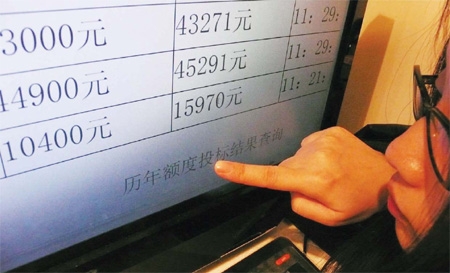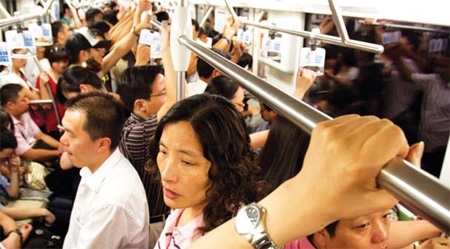Society
Shanghai number plates worth more than a car
Updated: 2011-01-07 12:56
By Wu Yiyao (China Daily European Weekly)
|
 The average bidding prices for a license plate in Shanghai were 15,970 yuan in December and 45, 291 yuan in November. Provided to China Daily |
More than 100,000 aspiring drivers have already applied to buy a private car in Beijing, just 12 days after the introduction of a number plate lottery policy.
But Shanghai drivers have it even worse.
"A car plate in Shanghai is perhaps the most expensive piece of steel in the world," said Li Shunji, a 29-year-old resident in Shanghai.
"You can actually buy another car with the money going to the license plate," he said.
A license plate for a private car in Shanghai costs 100 times as much as one in Beijing, judging by a November 2010 auction in which 13,429 bidders competed for 8,500 license plates.
The average price for a license plate at the auction was 45,291 yuan (5,201 euros), and the minimum bid for a plate was 44,900 yuan.
At the December 2010 auction, bidding prices were unusually low, the average price of 15,970 yuan, but still much higher than in other cities.
The bidding policy will not last forever and will be replaced by new policies as public transportation in Shanghai has been improving, according to Wu Yi, deputy head of the Shanghai Municipal Urban Communication Administration Bureau.
Zhu Yijun, director with the Automobile Research Office of the Shanghai Information Center said the policy will not end until 2012 when subway lines reach 500 kilometers, China Auto News reported.
From 1994 to 2008, more than 15.55 billion yuan had been collected from the car plate license auctions, according to the Shanghai Municipal Government.
About 14 billion yuan was spent on supporting public transportation, including constructing ring roads and new subway lines and subsidizing bus and ferry services.
But whether the bidding policy effectively helps reduce car density and improves public transportation is still in doubt.
|
 Passengers on the No 2 Line subway in Shanghai during the afternoon rush hour. Wang Chen / for China Daily |
Li said although he has waited for more than two years for a private car license plate, he insists he will one day own a car.
"Considering the convenience of a private car and the inconvenience and high cost of taking subways, I will buy my own car for sure," he said.
Shanghai commuters compared to their Beijing counterparts pay more for public transportation, according to a report by the National Bureau of Statistics Shanghai Investigation Team released on Dec 27, 2010.
The report showed that Shanghai commuters spend 50.4 minutes on a single trip from home to their workplace and nearly 80 percent of 2,598 respondents said they spend more than 5 yuan on public transportation everyday.
About 22.5 percent of respondents said they spend more than 10 yuan on public transportation everyday.
"In Beijing people pay 40 fen (0.04 euros) for a bus ride and 2 yuan for a subway ride regardless of length, but I have to pay at least 20 yuan on public transportation everyday - that's 600 yuan a month," Li said.
Shanghai and Beijing are not the only cities suffering major traffic congestion. Shenzhen, a mega city of Guangdong province, has the highest vehicle density in China and is also looking at solutions to improve traffic flow on its roads, which have been mocked as the largest parking lots in the nation.
As of Dec 3, the city had more than 1.7 million registered vehicles, which approaches the official limit.
The average driving speed was only 36.3 km/h on major highways and roads by the end of 2010, compared to 40.7 km/h by the end of 2008.
Guangzhou, the capital of Guangdong province, may reinstate driving restrictions based on an odd-even number plate system, which was successfully used during the Asian Games, a city official recently revealed.
However not everybody agrees. "This policy will only encourage people to buy a second car," said Zhou Aixing, a resident in Guangzhou. What if the roads get too clogged in the future? "Perhaps I will resort to a private plane, seriously," he said.
E-paper

Ear We Go
China and the world set to embrace the merciful, peaceful year of rabbit
Preview of the coming issue
Carrefour finds the going tough in China
Maid to Order
Specials

Mysteries written in blood
Historical records and Caucasian features of locals suggest link with Roman Empire.

Winning Charm
Coastal Yantai banks on little things that matter to grow

New rules to hit property market
The State Council launched a new round of measures to rein in property prices.
